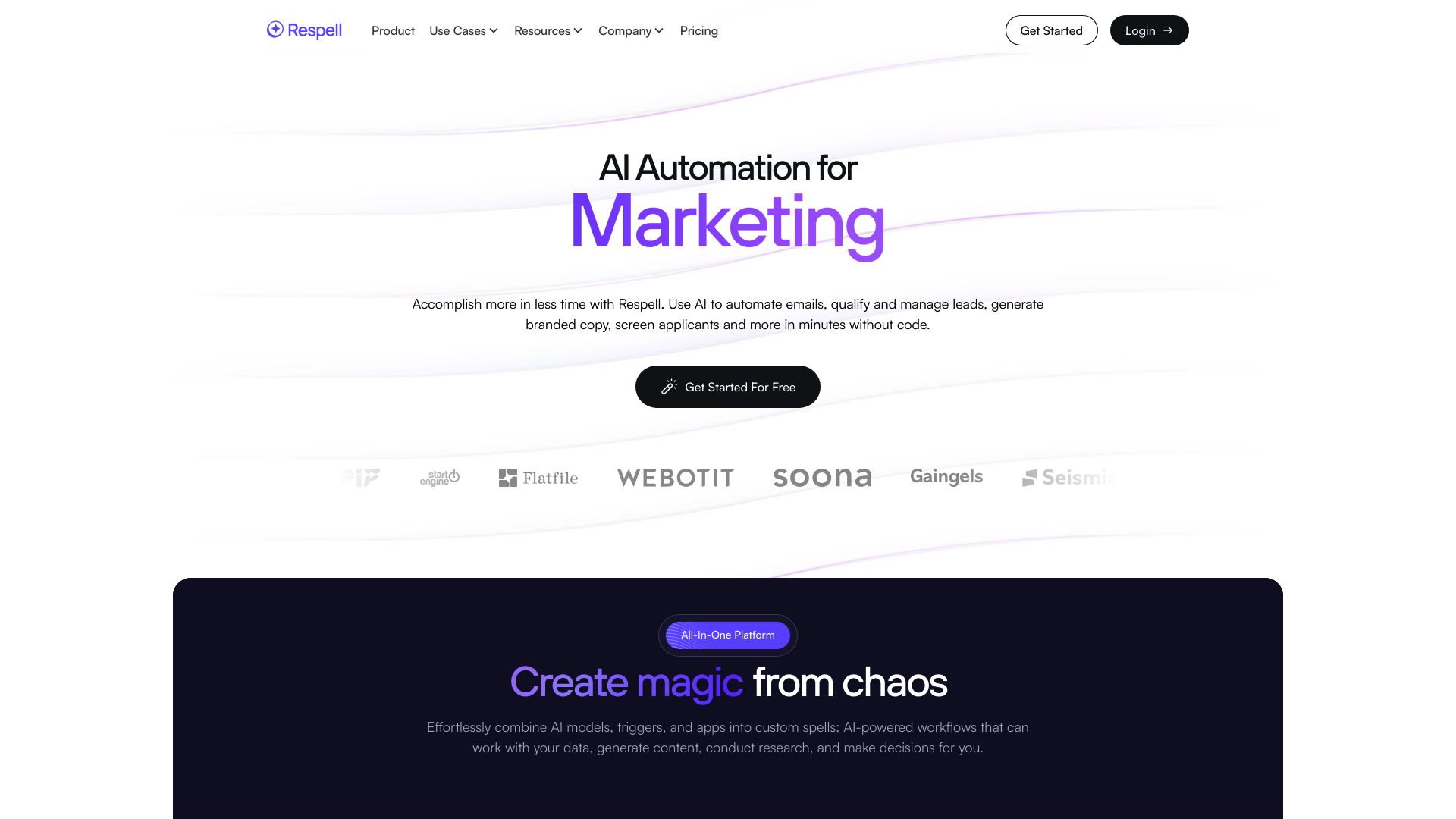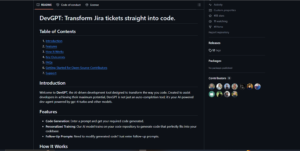Respell vs. DevGPT: Comparing AI Development Tools
AI-driven development tools transform how businesses create, deploy, and manage intelligent solutions. Respell’s no-code platform empowers users to build AI workflows visually, while DevGPT focuses on generating code from natural language. This comparison examines how these tools stack up against SmythOS, a comprehensive platform for AI agent creation and deployment. We’ll explore key features, use cases, and integration capabilities to help you choose the right solution for your AI development needs. Whether you’re a seasoned developer or a business user seeking to harness AI’s power, this analysis provides insights to guide your decision-making process.
Respell Overview
Respell empowers users to create AI-driven workflows and automations without coding expertise. The platform’s visual Spell Studio allows drag-and-drop construction of AI agents for tasks ranging from customer service to data analysis.


At the heart of Respell’s offering is Elle, an AI assistant that guides users through the platform and suggests process improvements. The Explore page provides pre-built templates for common use cases, accelerating implementation. Respell integrates with popular services like Airtable, Salesforce, and Slack, extending its reach across business workflows.
Respell empowers users to create AI-driven workflows and automations without coding expertise. The platform’s visual Spell Studio allows drag-and-drop construction of AI agents for tasks ranging from customer service to data analysis.
Respell’s strength lies in its accessibility. The no-code approach opens AI development to non-technical users, while still offering depth for experienced developers. However, this ease of use may limit customization options for highly specialized applications. The platform lacks some advanced features like hosted vector databases or dedicated crawlers for web content.
Scalability and security are prioritized, with support for development and production environments, data encryption, and OAuth authentication. Respell allows deployment of AI agents as APIs, webhooks, or scheduled tasks, providing flexibility in how businesses leverage the technology. While pricing details aren’t publicly available, the platform aims to be cost-effective for businesses of various sizes.
Respell positions itself as an enabler of AI democratization, targeting a broad audience from individual developers to enterprise teams. Its vision aligns with the growing demand for accessible AI tools that can drive innovation across industries. As the AI landscape evolves, Respell’s challenge will be maintaining its user-friendly approach while expanding its capabilities to meet increasingly complex AI applications.
DevGPT Overview
DevGPT transforms natural language prompts into executable code, streamlining software development workflows. This open-source AI assistant empowers developers to describe coding needs in plain English, generating context-relevant code snippets automatically.


DevGPT’s key features include personalized training on a developer’s codebase, editable output for fine-tuning generated code, and significant time savings. Users report over 10 hours saved per week on repetitive coding tasks. The platform integrates with services like GitHub and Jira, streamlining pull request generation from tasks and tickets.
DevGPT transforms natural language prompts into executable code, streamlining software development workflows. This open-source AI assistant empowers developers to describe coding needs in plain English…
Leveraging models such as GPT-4 and Codex, DevGPT focuses on serving individuals and small teams. Its vision aims to become an indispensable AI-powered coding companion for developers and software teams of all sizes. The platform seeks to build an engaged community of users and contributors to drive future product development.
While DevGPT offers impressive capabilities, it currently lacks some advanced features found in enterprise-grade solutions. The platform does not explicitly mention support for data lakes, IP control, or staging/production domains. Additionally, there’s no indication of specific tools for sitemap crawling or YouTube transcript processing.
DevGPT positions itself as an accessible tool for enhancing developer productivity. Its integration with existing tools and contextual outputs tailored to teams differentiate it in the AI coding assistant market. As the platform evolves, expanding its feature set and scalability could further solidify its position in the competitive landscape of AI-powered development tools.
Feature Comparison
Respell and DevGPT offer distinct approaches to AI-powered development, with some key differences in their feature sets. Respell provides a comprehensive no-code platform for building AI workflows, while DevGPT focuses on generating code from natural language prompts.
In core components, Respell’s visual Spell Studio enables drag-and-drop creation of AI workflows without coding. DevGPT lacks this visual builder, instead translating text descriptions directly into code. Respell’s pre-built templates and integrations with services like Airtable and Salesforce give it an edge for business users. DevGPT’s strength lies in its ability to generate contextually relevant code snippets, saving developers significant time on repetitive tasks.
Security features highlight another gap between the platforms. Respell emphasizes data encryption and OAuth support, critical for enterprise deployments. DevGPT, as an open-source tool, leaves security implementations largely up to the user. This makes Respell a stronger choice for organizations with strict data protection requirements.
Feature Comparison Table
| Respell | DevGPT | SmythOS | |
|---|---|---|---|
| CORE FEATURES | |||
| Hosted Agents (Dev, Production) | ✅ | ❌ | ✅ |
| Environments (Dev, Production) | ✅ | ❌ | ✅ |
| Visual Builder | ✅ | ❌ | ✅ |
| No-Code Options | ✅ | ❌ | ✅ |
| Autonomous Agents | ✅ | ❌ | ✅ |
| Explainability & Transparency | ✅ | ❌ | ✅ |
| Multimodal | ✅ | ❌ | ✅ |
| Multi-Agent Collaboration | ✅ | ❌ | ✅ |
| Audit Logs for Analytics | ✅ | ❌ | ✅ |
| Bulk Work | ✅ | ❌ | ✅ |
| Agent Work Scheduler | ✅ | ❌ | ✅ |
| Logs & Monitoring | ✅ | ❌ | ✅ |
| SECURITY | |||
| Constrained Alignment | ❌ | ❌ | ✅ |
| Data Encryption | ✅ | ❌ | ✅ |
| OAuth | ✅ | ❌ | ✅ |
| IP Control | ❌ | ❌ | ✅ |
| COMPONENTS | |||
| Foundation AIs | ✅ | ❌ | ✅ |
| Huggingface AIs | ❌ | ❌ | ✅ |
| Zapier APIs | ✅ | ❌ | ✅ |
| All other APIs, RPA | ✅ | ❌ | ✅ |
| Classifiers | ✅ | ❌ | ✅ |
| Logic | ✅ | ❌ | ✅ |
| Data Lakes | ❌ | ❌ | ✅ |
| DEPLOYMENT OPTIONS (EMBODIMENTS) | |||
| Deploy as API | ✅ | ❌ | ✅ |
| Deploy as Webhook | ✅ | ❌ | ✅ |
| Staging Domains | ❌ | ❌ | ✅ |
| Production Domains | ❌ | ❌ | ✅ |
| API Authentication (OAuth + Key) | ✅ | ❌ | ✅ |
| Deploy as Site Chat | ✅ | ❌ | ✅ |
| Deploy as Scheduled Agent | ✅ | ❌ | ✅ |
| Deploy as GPT | ❌ | ❌ | ✅ |
| Scalability | ✅ | ❌ | ✅ |
| DATA LAKE SUPPORT | |||
| Hosted Vector Database | ❌ | ❌ | ✅ |
| Sitemap Crawler | ❌ | ❌ | ✅ |
| YouTube Transcript Crawler | ❌ | ❌ | ✅ |
| URL Crawler | ✅ | ❌ | ✅ |
| PDF Support | ✅ | ❌ | ✅ |
| Word File Support | ✅ | ❌ | ✅ |
Best Alternative to Respell and DevGPT
SmythOS emerges as the superior alternative to Respell and DevGPT, offering a comprehensive platform for AI agent creation and deployment. Our solution combines powerful features with unparalleled ease of use, making it the ideal choice for businesses and developers alike.
We designed SmythOS to address the limitations of other platforms. While Respell focuses on no-code AI workflows and DevGPT specializes in code generation, SmythOS provides a versatile ecosystem for building and managing AI agents across various use cases. Our drag-and-drop interface allows users to create complex AI workflows without extensive coding knowledge, democratizing AI development for both technical and non-technical users.
SmythOS provides a versatile ecosystem for building and managing AI agents across various use cases. Our drag-and-drop interface allows users to create complex AI workflows without extensive coding knowledge…
SmythOS stands out with its robust feature set. We offer hosted agents for both development and production environments, ensuring seamless transitions from testing to deployment. Our platform supports multimodal interactions, enabling AI agents to process and respond to various data types including text, images, and audio. This versatility opens up a world of possibilities for creating sophisticated AI applications.
Security and scalability set SmythOS apart from competitors. We implement advanced data encryption and OAuth authentication, providing enterprise-grade security for your AI projects. Our platform easily scales to meet growing demands, supporting everything from small-scale prototypes to large-scale production deployments. This flexibility ensures SmythOS can adapt to your needs as your AI initiatives evolve.
Unlike Respell and DevGPT, SmythOS offers a complete suite of deployment options. We enable users to deploy AI agents as APIs, webhooks, chatbots, or scheduled tasks. This versatility allows for seamless integration with existing systems and workflows, maximizing the value of your AI investments. With SmythOS, you’re not just building AI agents – you’re creating adaptable solutions that can be deployed exactly where and how you need them.
Conclusion
Respell and DevGPT offer unique approaches to AI-powered development, each with distinct strengths. Respell’s no-code platform enables broad accessibility, while DevGPT focuses on streamlining code generation for developers. However, SmythOS emerges as the superior choice, combining ease of use with advanced capabilities.
SmythOS’s drag-and-drop interface rivals Respell’s accessibility while offering greater customization potential. Unlike DevGPT’s focus on code generation, SmythOS provides a comprehensive suite of tools for creating, deploying, and managing AI agents across various platforms. This versatility makes it suitable for both technical and non-technical users, addressing a wider range of business needs.
The platform’s extensive integration ecosystem, supporting over 300,000 integrations, surpasses both Respell and DevGPT in terms of connectivity. SmythOS also offers robust security features, multi-agent collaboration, and advanced deployment options that are crucial for enterprise-level applications. These capabilities position SmythOS as a more scalable and future-proof solution compared to its competitors.
For those looking to harness the full potential of AI in their workflows, SmythOS offers a risk-free trial with unlimited agents. We invite you to explore our diverse range of AI-powered agent templates and experience firsthand how SmythOS can revolutionize your approach to AI integration and automation. Dive into our comprehensive documentation to discover how SmythOS can empower your team and drive AI-powered success in your organization.
Last updated:
Disclaimer: The information presented in this article is for general informational purposes only and is provided as is. While we strive to keep the content up-to-date and accurate, we make no representations or warranties of any kind, express or implied, about the completeness, accuracy, reliability, suitability, or availability of the information contained in this article.
Any reliance you place on such information is strictly at your own risk. We reserve the right to make additions, deletions, or modifications to the contents of this article at any time without prior notice.
In no event will we be liable for any loss or damage including without limitation, indirect or consequential loss or damage, or any loss or damage whatsoever arising from loss of data, profits, or any other loss not specified herein arising out of, or in connection with, the use of this article.
Despite our best efforts, this article may contain oversights, errors, or omissions. If you notice any inaccuracies or have concerns about the content, please report them through our content feedback form. Your input helps us maintain the quality and reliability of our information.
